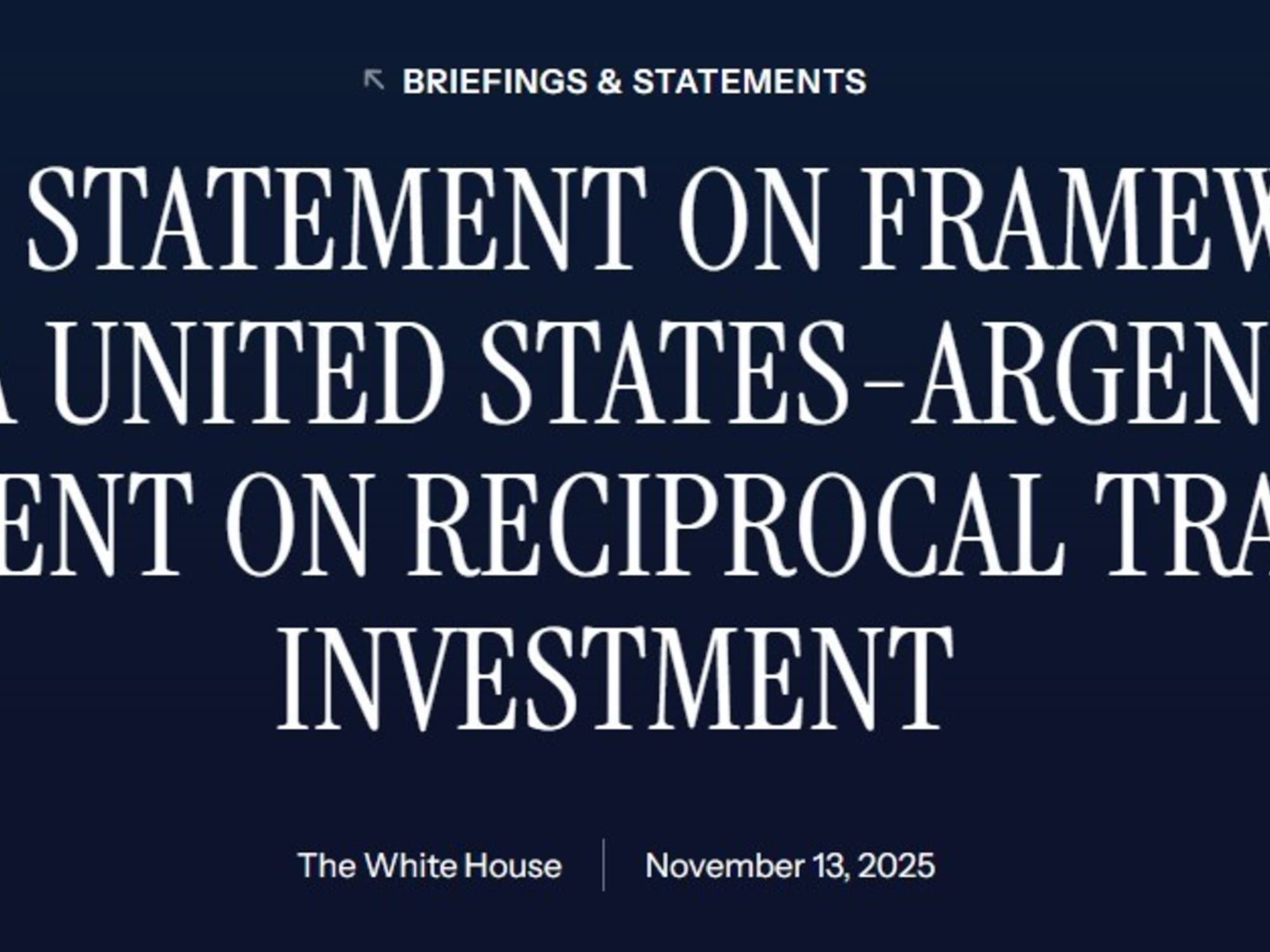The details of the trade agreement announced this Thursday by the governments of the United States and Argentina will be revealed after the signing in person by Presidents Donald Trump and Javier Milei, in a few weeks, according to reports.
But a detailed analysis by several specialists consulted by Clarín grouped the White House's communication as follows: Argentina accepted 12 commitments, the United States 1, and 6 are shared.
The document speaks of reciprocal trade and investment, but not of a “strategic partnership,” as it might have been if the aim had been to strengthen bilateral ties, which is nevertheless considered a historic event by the government and various sectors of the economy. The fine print remains to be seen and whether some of the points must be approved by Congress, as required by law in the United States.
The analysis of those commitments was based on what the document from Thursday states. That is, where it says"Argentina committed," "the United States committed," or "both countries" they establish or commit to one thing or another.
This is a framework and not the actual agreement of what the binational delegations negotiated over these months, and which culminated on Wednesday at the Office of the United States Trade Representative, Jamieson Greer, with Foreign Minister Pablo Quirno, along with Secretaries of State Pablo Lavigne and Alejandro Cacace, plus Ambassadors Luis María Kreckler and Alec Oxenford.
Regarding the only point that the United States considers its own commitment, it states that it will “eliminate reciprocal tariffs on certain unavailable natural resources and unpatented articles for use in pharmaceutical applications.”
There are few details on the matter, although the most optimistic believe that Trump would seek to lower the high tariffs he imposed on aluminum and steel, which have reached up to 50% since last April.
One of the strongest commitments Argentina made in the meantime is preferential market access for pharmaceuticals, chemicals, machinery, information technology products, medical devices, motor vehicles, and a wide range of agricultural products to the United States. At the same time, it committed to eliminating non-tariff barriers that restricted access to its market, including import licenses. With this, the country should no longer require consular formalities for U.S. imports into Argentina.
The agreement clearly aligns Argentina with international standards, which will allow the entry of US products that comply with applicable US or international standards, technical regulations, or US or international conformity assessment procedures, without additional conformity assessment requirements.
It will also require Argentina to eliminate non-tariff barriers affecting trade in priority areas of the United States, from which it will accept vehicles manufactured in the United States that comply with U.S. Federal Vehicle Safety and Emissions Standards, and will accept U.S. Food and Drug Administration (FDA) certificates and prior marketing authorizations for medical devices and pharmaceutical products. It remains to be seen how this will affect China, which has begun exporting its cars to Argentina.
In what was one of the most widespread demands the United States made of Argentina—the fight against piracy and counterfeit products—the country committed to addressing the structural challenges outlined in the 2025 Special Report 301 from the Office of the United States Trade Representative (OTC). This encompasses patents, including patentability criteria, patent delays, and geographical indications, as well as working to harmonize its intellectual property regime with international standards. A very lengthy demand, but some say that negotiations are underway with laboratories that benefited from the Kirchner administration's controversial 2012 resolution that tightened patent conditions to exclude China and India.
When consulted by Clarín, Marcelo Elizondo, director of the consulting firm DNI and one of the foreign trade specialists who most closely follows these matters, considered that regardless of whether the wording of the agreement is known or not, these documents"encourage investments, and it seems to me that there is a search on the part of the United States for investments from American companies in some sectors of interest to the United States, certainly minerals."
He said that from “a broader perspective” the relationship is “strategic, very fluid”, and “included US support at the IMF, the swap afterwards, the possible additional financing of $20 billion from private banks supporting the United States”.
"I believe it cannot be analyzed in general terms from an isolated point of view, but rather as part of a context," which he sees as "positive." He then complained that last year Argentina was among the five most closed economies.
Argentina will open its market to live cattle from the United States and has committed to allowing market access for poultry within a year and not restricting market access for products using certain designations for cheeses and meats. However, this will not apply facility registration requirements to imports of U.S. dairy products.
Another of the country's strong commitments is to address practices considered"distorting" by state-owned enterprises and industrial subsidies. And another area where the United States seems to be focused on China is the commitment to facilitate the United States' cross-border transfer of data, including personal data, and to refrain from discriminating against U.S. digital services or products.
Subsequently, the document announced on Thursday speaks generally about certain shared aspects that are repeated in those previously agreed upon with Argentina. Both countries state that they will open their markets to each other for key products. They committed to improving bilateral and reciprocal market access conditions for beef. The two countries also committed to identifying tools to harmonize their approaches to export controls, investment security, tariff evasion, and other important issues.
They will explore how to address non-tariff barriers affecting trade in food and agricultural products. They established a non-specific framework to facilitate investment, a long-standing demand of Argentina, and trade in critical minerals, where the Chinese also have a strong presence. The two countries also agreed to work to stabilize the global soybean trade.

